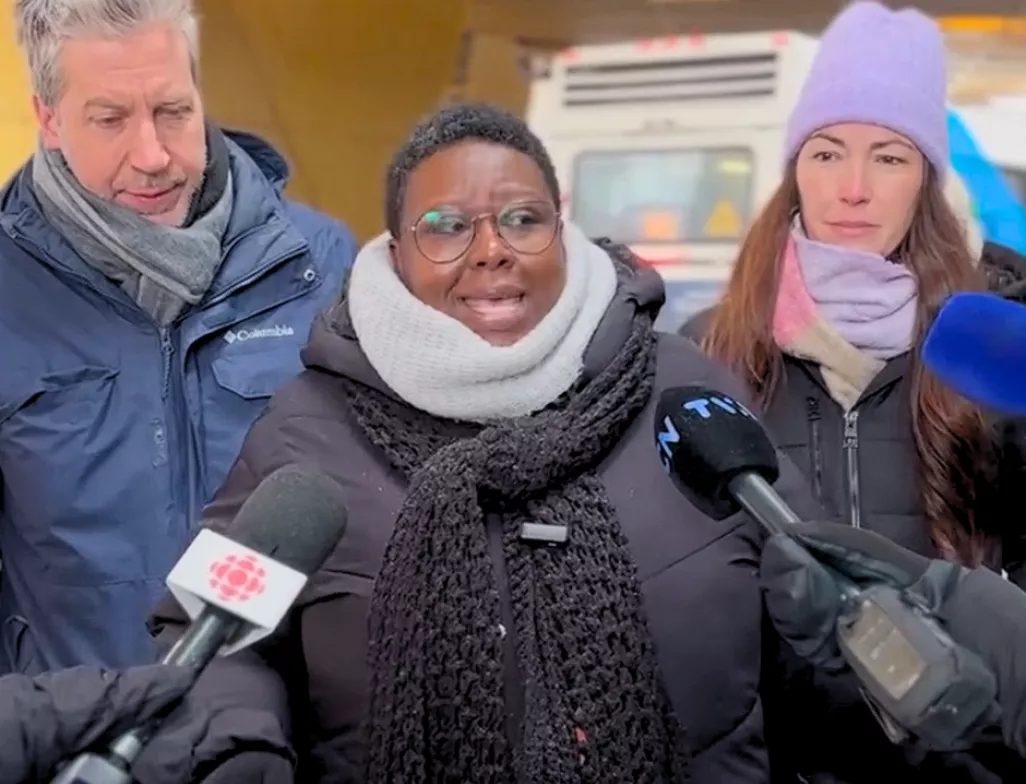In an ambitious move to reduce its environmental footprint, the City of Montreal is opening its very first closed-building organic waste treatment center. This innovative infrastructure, capable of processing 50,000 tonnes of waste a year - the equivalent of the weight of twenty Olympic swimming pools - responds to the growing urgency of finding sustainable solutions for urban waste management.
Managing organic matter responsibly, locally
By treating organic waste from associated cities and Montreal's west-end boroughs locally, the new Saint-Laurent organic waste treatment center is already helping to reduce greenhouse gas emissions by limiting transportation distances. In the past, a Montreal apple core traveled an average of 188 km before being processed; now, it travels just 6 km. The compost produced will then be used to enrich our soils.
Compost more, compost better
In a dense, urban city like Montreal, 80% of homes are currently served by municipal organic waste collection. Among homes with eight or fewer units, six out of ten people participate in composting, while this figure drops to three out of ten in buildings with nine or more units. The city and its partners are therefore mobilized to improve citizen participation in composting.
Starting next year, the Saint-Laurent composting center will be offering an educational program for school groups, to support behavioural change and increase composting participation among Montrealers. The city is also rolling out a campaign to help the uninitiated get started with composting, or to equip the initiated to do it better. These efforts complement the national campaigns of RECYC-QUÉBEC and Semaine québécoise de réduction des déchets, which are working together to define a new social norm around composting participation.
A composting center in harmony with its neighborhood
In line with the recommendations of the OCPM's 2012 report, a permanent monitoring committee has been set up to facilitate the harmonious integration of the center into its environment. The committee, made up of citizens, businesses, civil society organizations, administrative representatives and elected officials from the boroughs of Saint-Laurent, Pierrefonds-Roxboro and Ahuntsic-Cartierville, contributed to the various stages of the project.
With this in mind, the Saint-Laurent organics processing center is a fully enclosed and airtight LEED Gold-certified building that exceeds the highest air quality standards. Thanks to the use of closed-tunnel composting technology, airlocks at access doors and the maintenance of negative pressure in the building, odors are captured and treated by a high-performance air treatment system. Rigorous monitoring is carried out on the air exhausted through the chimney, in the ambient air via mobile sensors, and by means of a weather station installed on site.
Passages exothermiques, a work by Philippe Allard and Alexandre Burton
The construction of this center incorporates a work of public art by artists Philippe Allard and Alexandre Burton. Passages exothermiques is a work in two parts. The work is inspired by various sources: the movement of a decomposing leaf, the heat fluctuations created during composting, and the polygonal shape generated by cell growth. The outdoor installation illustrates what is happening above ground, while the indoor component, to be installed at a later date, offers an atmospheric experience of what is happening underground, in the factory. The installation was produced as part of the Quebec government's Policy for the Integration of the Arts into the Architecture and Environment of Government and Public Buildings and Sites.
Financial package
The design and construction of the organics treatment center was carried out at a total cost of $169 million, broken down as follows:
- Government of Canada (FIV) and Government of Quebec (PTMOBC): $56 million;
- Agglomération de Montréal: $113 million (including $23 million for land acquisition);
- City of Montreal: $569,000.
For more informations : montreal.ca.
QUOTES
“Our government recognizes the importance of investing in environmental protection and public health. The Saint-Laurent composting center project is part of this commitment. It's a powerful symbol of our commitment to sustainable waste management and environmental protection. Together, we're building a greener future for generations to come.
- The Honourable Steven Guilbeault, Minister of the Environment and Climate Change and Member of Parliament for Laurier--Sainte-Marie
“I am delighted to mark today's opening of the brand-new Saint-Laurent composting center, a project that will enable us to make significant progress towards sustainable urban waste management. This is a major project not only for Saint-Laurent, but for the entire city of Montreal. Green projects like the one we're celebrating today are essential to reducing our carbon footprint and protecting our environment.”
- Emmanuella Lambropoulos, MP for Saint-Laurent
“Our government is firmly committed to transforming our economy to make it more low-carbon and combat climate change. This is true in all key sectors, including waste management, where we can significantly reduce greenhouse gas emissions from landfill. That's why we're proud to support promising projects like the Ville de Montréal's, which will help us achieve our climate objectives.”
- Benoit Charette, Minister of the Environment, the Fight against Climate Change, Wildlife and Parks and Minister responsible for the Laurentides region
“At a time when our landfill sites are reaching capacity and half a garbage bag is made up of compostable materials, this very first composting center in Montreal will have a major impact on reducing waste and giving a second life to organic residues throughout the metropolitan region. Thanks to our efforts, nine out of ten Montreal homes now have access to composting. We will continue to deploy a number of awareness-raising measures to ensure that the entire population contributes to composting, which is an essential social effort.
Valérie Plante, Mayor of Montréal
“Thanks to the opening of the new Saint-Laurent organic materials processing center, Montreal compost will now travel far fewer kilometers. Before, a single apple peel could travel an average of 188 km to be processed. Today, thanks to this local infrastructure, this journey is reduced to just 6 km. This considerable reduction in distances contributes directly to reducing greenhouse gas emissions, while promoting more responsible and ecological management of our organic matter, right here in Montreal. It's a great step forward for our environment and our circular economy.”
- Marie-Andrée Mauger, responsible for ecological transition and the environment on the executive committee of the Ville de Montréal.
“The completion of the Saint-Laurent Organic Materials Processing Centre is testimony to our deep commitment to reducing landfill waste. By transforming organic materials, we are taking a significant step towards more responsible and sustainable management of our resources. This project is part of the Saint-Laurent Climate Emergency Plan, which aims to find solutions for the indispensable adaptation of our times in the face of current and future environmental challenges. We are extremely proud to contribute to a greener, more sustainable future for the entire Montreal community, by offering ecological solutions that will benefit future generations.”
- Alan DeSousa, Mayor of the Borough of Saint-Laurent
“Veolia is proud to partner with the City of Montreal and put forward this vision of a sustainable future for our children and grandchildren. This project is perfectly aligned with Veolia's global strategy called GreenUp, which focuses on growth and sustainability. It allows us to deploy cutting-edge solutions and technologies, our expertise and experience, all in support of the City of Montreal.”
- Frédéric Van Heems, President and CEO, Veolia North America
“When we landfill organic matter, we create pollution by producing leachate and methane, which is a powerful greenhouse gas. When we compost it, we transform it into a resource in the form of a much-needed soil improver. All this, while contributing to the longevity of our landfill sites. This project is a win-win-win.
- Karel Ménard, General Manager, Front commun québécois pour une gestion écologique des déchets



